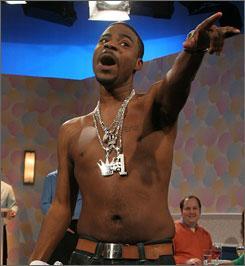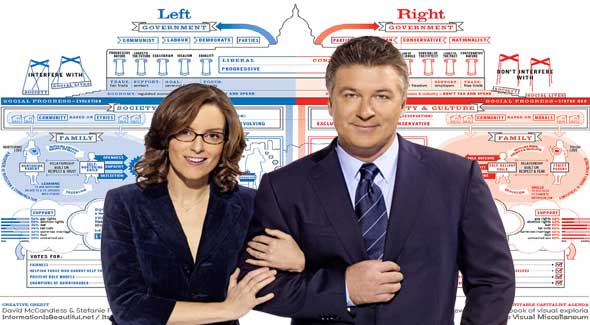About a month ago, I was in the midst of writing my last article on the politics of Battlestar Galactica when I stumbled on this site. What had happened was that I had Googled something like, “Battlestar Galactica liberal TV shows,” so I could see whether or not the masses thought the Cylons were supposed to be commies or terrorists or neocons or what. Anyway, I read the article and perused the TV-show political spectrum graph, which looks like this:
And I said, “30 Rock is the most liberal show on TV? What the what?” Bear in mind that, at this time in my life, I wasn’t a huge fan of 30 Rock. It was one of those shows that I watched when I had nothing better to do, not appointment television, in other words. Up to this point, I had probably seen around twenty episodes of the show. So I said to myself (in the accent of 30 Rock’s Kenneth Parcell), “Wait a goshdarn minute there, Ms. Mlawski! Just because your first inclination was to disagree with this nice blogger’s TV-politics spectrum, maybe you should withhold judgment until you’ve actually watched all of 30 Rock.”
And so I did. Over the last month, I have watched all of the remaining episodes of that lovely little sitcom and have come to the following conclusion:
“30 Rock is the most liberal show on TV? What the what?!”
From far away, if you squint, 30 Rock does look like a very liberal show. The premise of the show is this: The harried, liberal head writer of a live sketch comedy show constantly butts heads with her wacky cast and conservative, corporate boss:

Looks like a liberal satire, doesn’t it? The main character is the put-upon, progressive voice of reason in a crazy world ruled by an evil libertarian boss who cares about nothing but profits.
Except that’s clearly not what 30 Rock is in practice. First, let’s look at the main characters, Liz Lemon and Jack Donaghy.
At first glance, Liz Lemon seems like 30 Rock’s “only sane woman,” the one voice of reason amid a cacophony of insane voices. She’s the Kermit the Frog, the Michael Bluth, the Leela, the Better Off Ted. If Liz were the main character of almost any other program on the air, we’d expect her to be the stand-in for the show’s writers, used the same way Seth McFarlane uses Brian on Family Guy to espouse his (usually) liberal politics and the same way Trey Parker and Matt Stone use Stan and Kyle on South Park to espouse their (usually) libertarian politics. And we’d be forgiven for making such an assumption. After all, Liz Lemon is played by and clearly based on Tina Fey, the show’s creator and head writer.
At first glance, then, it appears that Fey will use Liz Lemon to champion her own liberal politics. For instance, in the season 1 episode, Hard Ball, Liz says, “I love America. Just because I think gay dudes should be allowed to adopt kids and we should all have hybrid cars doesn’t mean I don’t love America.” Then, in true meta 30 Rock-style, Liz winks at the camera, telling us this isn’t what Liz Lemon believes, necessarily, but what Tina Fey believes. Here, Fey isn’t only using Liz Lemon as a mouthpiece; she’s making us aware that she’s aware that she’s using Liz as one.
But if you watch the entire show, you’ll soon see that Liz only APPEARS to be 30 Rock’s sane, liberal author avatar. First of all, Liz is clearly only sane in comparison to people like this:
While Liz may have started out as the one reasonable, pitiable person in a sea of sociopathic nutcases, over the last three seasons, she’s shown that she is the owner of her very own brand of crazy. She’s roofied Don Draper, called in a potential Amazing Race contestant to Homeland Security as a terrorist, sexed up a business consultant so she wouldn’t have to lose her precious snack table, sexually harassed the leader of her sexual harassment course so she’d get time off from work, fired an accountant just because she happened to be dating the guy Liz had a crush on, and made poor Kenneth the Page take the fall for something she should have gotten fired for. Liz Lemon didn’t come here to make friends. She came here to be number one! Liz Lemon is the Generalissimo. She is the decider. Lemon out.
Let’s face it, Liz Lemon ain’t the likable, reasonable straight man, and she ain’t all that liberal, either. Although she often claims solidarity with the workers, she rarely stays on their side. She went to get a flu shot even when she said she would not do so until her crew got them, too. The minute she got promoted, she screamed, “Suck it, monkeys! I’m going corporate!” to her underlings. She even admitted she would probably vote for John McCain but tell her friends she voted for Obama.
Even when Liz is talking about liberal politics, the show goes out of its way to mock her for doing so. Consider this classic scene:
LIZ: “Look at the educational system in this country. We spend all this money in Iraq but meanwhile our inner city graduation rates are lower than they are in the Sudan.”
PETE: “That doesn’t sound right.”
LIZ: “Maybe it was Sweden. Maybe it was teen pregnancy. I’ve gotta read more.”
If 30 Rock were more like, say, South Park, Liz Lemon’s character would be like Stan: the voice of reason who acts as the writers’ mouthpiece for a particular worldview. Although it seems at first like Liz is filling this role, she’s really just a figure of mockery, just like all of the other characters.

I’m jacking!
Liz Lemon appears to be the liberal voice of reason but is neither liberal nor reasonable; likewise, Jack Donaghy appears to be her evil conservative foil but is not. Admittedly, in the first half of the first season, Jack Donaghy did play the role of the amoral, conservative corporate head that Liz needed to defeat in office combat. The show, however, dropped that type of satire very early on. While 30 Rock’s writers do make fun of Jack for his monomaniacal obsession with profits and prestige (as well as his unhealthy love of Ronald Reagan), I would argue that Jack, not Liz, has quickly become the show’s voice of reason and emotional center. In fact, if we look at 30 Rock as a whole, the main storyline has been one about Liz Lemon becoming more like Jack Donaghy than the other way around.
Let’s talk about Jack’s politics first. Unlike Liz Lemon, whose progressive credentials don’t hold up to close scrutiny, Jack is clearly a (somewhat exaggerated) neocon, through and through. He believes in profit and the market above all, hates taxes, does not appreciate unions, and believes in forcing his own beliefs on others, often by use of force. He goes to the New York stock exchange when he’s horny. When he screws up, he pretends it never happened and gives himself a huge bonus. He believes that people from the American South are undiscriminating but morally superior to “the north’s elitist, east coast, alternative, intellectual, left wing” Jews.

Jack’s idea.
The only thing that makes Jack different from the stereotypical American Republican is his lack of religion. His bitter atheism, in fact, causes him to have a falling out with his Puerto Rican girlfriend, Elisa (Salma Hayek). Luckily, they are brought back together by the power of capitalism when they reignite their relationship over a shared love for McDonald’s McFlurries.
Although the writers mean us to chuckle knowingly at Jack’s over-the-top conservatism, they usually do not mock Jack as viciously as they do Tracy, Jenna, or even Liz Lemon. It is Jack, not Liz, who is presented as the most grounded, reasonable character in the show. And in most episodes, Jack gets the last word.
Take the pilot episode, for instance. Jack, head of microwave programming, comes in to ruin Liz Lemon’s TV show by applying his evil corporatist ideas to the creative process. Liz draws the line when Jack makes her hire Tracy Jordan, the crazy but extremely marketable movie star. We are meant to laugh at this, well, laughable decision, but it is hard to argue that this wasn’t the right call. While Tracy certainly makes Liz’s life more difficult, he made the show better and, yes, more profitable than before. And when Tracy quits TGS in a third season episode, everyone, including Liz, can’t wait to have him back. Jack 1, Liz 0.
Later in season one, Jack and Liz butt heads over his decision to add product placement to The Girly Show. Although we, the audience, laugh at Jack’s awkward attempts to further monetize what was supposed to be a creative, satirical TV show, 30 Rock’s writers cannot go too far in their satire. Since that episode, 30 Rock, the show about the show, has shilled for Snapple, Verizon, Cisco, SoyJoy, and, of course, GE. In fact, 30 Rock’s second season contains more than 140 instances of product integration. 30 Rock’s “satire” of Jack’s product placement shenanigans illustrate how the show’s writers constantly try to mock their cake and eat it, too. We laugh at Jack, but he has the last word both in the show-within-the-show (TGS) and the show (30 Rock) itself. Jack 2, Liz 0.

Affirmative action was designed to keep women and minorities in competition with each other to distract us while white dudes inject AIDS into our chicken nuggets.
These are just two examples of how 30 Rock’s writers like to poke mild fun at Jack’s politics but have him and his politics “win” most episodes. Here are some of the more obvious examples:
–Episode 2.1, Seinfeld-vision: To increase profits, Jack uses Jerry Seinfeld’s likeness in all of NBC’s TV shows. This is clearly both unfair and laughable (who would want to see Seinfeld in Heroes?), yet Jack wins the episode. Seinfeld does allow Jack to use his likeness in one show.
–Episode 2.4, Rosemary’s Baby: Jack fires classic comedy writer Rosemary Howard for her politics, a move that is first presented as drastic and unfair. Later in the episode, we learn that Rosemary is a crazy hippie and that Jack was, of course, right to fire her. (This also convinces Liz that she needs to be more capitalist—“I have to do that thing that rich people do where they turn money into more money. Can you teach me how to do that?”—making this episode a double win for Jack.)
–Episode 2.7, Cougars: Jack takes over an inner-city baseball team in an obvious parody of the Iraq War. (“Fun Accomplished!”) At first, Jack is shown as an incompetent stand-in for President Bush. When he decides to “stay the course,” the “natives” (i.e. the inner-city kids) rebel and destroy the new equipment Jack bought for them. However, even though the first 90% of the episode mocks Jack and his neoconservative politics, he STILL wins the episode with a “surge”—he gets Grizz and Dot-Com to pretend to be children so they can win the baseball game. Again, we are meant to laugh at Jack’s ill-conceived plans, yet his plans succeed in the end. The episode seems to be saying, “Look how silly Republican policies are… yet only silly Republican policies can win the day!”
–Episode 4.1, Episode 401: Jack takes a huge bonus even though employee salaries are being cut, and then he gets aggressive when Kenneth organizes a strike. This conflict ends in a near-draw: Kenneth gets Jack to admit he’s a liar, but Jack also gets to keep cutting salaries and keep his exorbitant bonus. The moral of the story seems to be, “Union busters are evil, self-interested, and laughable, but union leaders are just the same!” Doesn’t sound all that liberal to me.
Certainly, Jack’s conservative worldview doesn’t always win the day in 30 Rock: Jack and Liz both get their comeuppance for their classism by getting the flu in the “Flu Shot” episode; Dick Cheney, Jack, and some other members of the Bush administration accidentally “gay bomb” themselves in the second season finale. But Jack and his conservative worldview win out often enough (especially over Liz Lemon’s supposedly liberal worldview) that we cannot rightly say that 30 Rock is some kind of trenchant progressive satire.
Not only do conservative strategies often win in 30 Rock; liberal policies often lose. Take the second season episode, “Greenzo,” which guest-stars David Schwimmer as an environmental spokes-mascot for NBC. We quickly learn that Greenzo is certifiable and violent, which makes the environmentalism he preaches seem, by proxy, stupid and extreme. The episode tries to juxtapose Greenzo with a real environmentalist in the form of Al Gore, but Al Gore is presented as only slightly less silly. “Quiet!” he says, holding up a hand in front of Liz Lemon. “A whale is in trouble! I have to go.”

If any one thing killed the Green movement, it was Greenzo: the most annoying character ever (except for Jennifer Aniston’s character).
Or consider the late third season episode, “The Natural Order,” which seems to maintain that gender equality means that men should be allowed to fart in women’s faces all the time, especially in the workplace, and that short, upper-body deficient women should never be allowed to ask taller, stronger men for help replacing the water in a water-cooler. Clearly someone on 30 Rock’s writing staff has a problem with feminism.
This all goes to show that 30 Rock is not some biting liberal satire of conservative policies and ideals. It is a funny sitcom that sometimes makes light political jokes but whose own politics are somewhat inconsistent. Mlawski out.
[Note #1: Long after I wrote this post, I ended up stumbling upon this gem from Slate, which basically makes the same points as this article in half the words. So, uh, hooray for Slate. …Bastards.]
[Note #2: The political spectrum used in the OTI main page carousel comes from here. It’s pretty cool.]


I would go so far as to say that 30 Rock is a biting satire of liberal policies and ideals… but from a liberal’s point of view. The message being something like, “Because we are foolish and weak, people like Jack Donaghy run the world. God damn it.” There’s a difference between Jack getting to win all the time, and it being right that he wins all the time.
But even if I’m right about this, it’s still not a particular liberal show. And I also have a problem with South Park falling right in the middle of that chart… it’s really pretty conservative, isn’t it? But 24 seems well-placed.
As I lie here, in my bad, dying by a cruel hand of flu, I rise my head and whisper… “Thank you, Mr. Mlawski. Thank you, Mr. Lee. You made my last days less tragic…”
*KHHHH*…*eh*
(I still have three episodes of 3th season to go. But I keep them for rainy days, good thing that 4th season is currently going strong on your TV)
@stokes: And I also have a problem with South Park falling right in the middle of that chart… it’s really pretty conservative, isn’t it?
South Park has often been called more libertarian than anything else. So unless Gawker develops some crazy two-dimensional political spectrum, right in the middle is the best place for it.
right after reading this I saw an ad for Ann Coulter. I’m not sure if that’s a good or bad thing…
but brilliant article!
@Perich – How are libertarians half-conservative, half-liberal? If you take the classic view that liberals want to legislate a better morality and engineer a better economy, and conservatives want the government out of people’s lives and out of their pocketbooks, then libertarians are just very pure conservatives. In more recent years, these definitions have shifted: most people now would tell you that liberals want to engineer a better (well, fairer) economy, but want the government out of people’s lives, while conservatives want to legislate morality and leave the economy alone. Here you could put libertarians in the middle, since they take one from column A (no legislating morality) and one from column B (no messing around with the economy)… but only if you put communists in the middle too, since they also take one from each column. What’s more, these definitions are bunk anyway, since I, as a liberal, can tell you that we do still want to legislate morality: it’s just our morality. (Hate crimes statutes, anyone?) And on the conservative side of the coin, well, giving giant tax breaks to the very rich is not actually a way for the government to keep its hands off the economy.
@stokes: Your reply calls out the inherent problems of a one-dimensional political spectrum, to which I already alluded.
I think South Park is definitely the middle of the spectrum. If not that, then what is your suggested replacement?
Clearly someone on 30 Rock’s writing staff has a problem with feminism.
It’s perfectly valid to point out the occasional ridiculousness of Manhattan feminism — where women decide what gender rules men should follow and which ones they shouldn’t. Also known as “everyone is equal but you better believe you’re still paying for dinner.”
I liked this piece, I thought your supported your argument quite well. However, I do think that somebody could just as easily write the other side of this debate and find an equal number of examples about it.
I’d say 30 Rock is a show that tries to skewer hypocrisy and selfishness more than anything else. However, in terms of political world view the show as a whole is surely left of center, just not hardline Democrat. The show, and Tina Fey herself, is more liberal than conservative but definetly willing to cross party lines and take things issue by issue, policy by policy.
@Tom P: I might have agreed with what you call “the occasional ridiculousness of Manhattan feminism,” if that was what “The Natural Order” discussed. But Liz Lemon wasn’t expecting the men she worked with to open doors for her or pay for dinner – she’s just not that type of character. Now, if Jenna did those things, I wouldn’t be at all surprised. Maybe the episode would have worked better for me in that case.
Let’s take apart the three things that Liz has to do in “The Natural Order” to be taken seriously as an equal:
1. She has to sit in an enclosed space at work with a dozen farting men. To frame this as a gender issue is strange to me. Surely all bosses, male or female, prefer that their employees don’t constantly fart in the workplace. Scratch that – surely all PEOPLE, male or female, prefer to work in fart-free spaces. Or am I being too girly here? Do we need to add a poll?
2. She is forced to replace the water in a water cooler. To me, this isn’t a gender issue, either. This is an “upper body strength” or “height” issue. Any short person, especially a short person who doesn’t work out, is going to have trouble replacing the water in a water cooler. This part of the episode is akin to saying, “There shouldn’t be gender equality because most women can’t be firefighters.” That kind of argument ignores the following facts: a) Some women ARE strong enough to be firefighters/replace water in the water coolers. b) Some men AREN’T strong enough to do either of these things. c) That’s not, primarily, what feminism is about. Yes, some men are taller and physically stronger than some women. The stereotype is that they can change lightbulbs more easily. If this is true, bravo, guys. That doesn’t mean we females don’t deserve abortions, equal pay for equal work, or the ability to hold political office.
3. Liz is told she must attend a bachelor party at a strip club. She is not excited. (Let’s ignore, for the moment, the fact that in the pilot episode of the series, she went to a strip club and had a fine time. Continuity isn’t exactly the show’s strong suit.) Liz, like many people, male or female, is disgusted by the idea of strip clubs in general. She seems to think them misogynistic. When she leaves for the club, she weakly exclaims, “Yeah! Let’s see some naked daughters and moms!” Once again, to the writer of this episode, “gender equality” means “if women want to be taken seriously as human beings, they have to do every dumbass thing jerkish men do, regardless of whether it makes sense or is ethical.”
Men fart more often, even when it is obviously inappropriate; therefore, Liz needs to fart and allow farting. Men, on average, are taller and have longer arms; therefore, Liz needs to act as if she’s tall, even when she clearly isn’t. Men like degrading women in strip clubs; therefore, Liz needs to degrade women in strip clubs, too. What next? Men murder and rape more than women; therefore, Liz needs to start murdering and raping to be considered an equal?
Great article. I’m really curious about the placing of some of those television programs as well. The Hills is conservative? Judging from the limited amount of Hills-related knowledge that somehow forced its way into my brain without my consent, is there any place for politics on that show at all?
I didn’t see the episode, so I don’t know the direct context but — was it based around her desire to be treated like “one of the guys” or “be treated the same as everyone else”? If that was the case, then it was probably an over the top goof on “be careful what you wish for.” Yes, a group of male comedy-writers working in an office together would probably try to outfart each other. They’d probably find it funny. They wouldn’t do it with a woman around. I think if you were to post the poll, most people would prefer to work in a fart free environment, but most men would find an inappropriate fart-off amongst their officemates to be funny. Asked if they would have an inappropriate fart-off with a woman in the room, probably not.
There’s a difference between “being taken seriously and treated as an equal in the political and professional world” which every -person- equally deserves and “being one of the guys” which is, yes, getting farted in front of and going to strip clubs. They are not the same thing. I don’t think any of those things create a direct leap to “women shouldn’t be allowed in the workplace, should get paid less, get abortions, or commit murder/suicides to be taken seriously.”
Another comment – I’d just like to point that I just watched the pilot today, and Liz Lemon didn’t necessarily have a “fine time” at the strip club. She gave the stripper money for “computer classes” and spends the entire time rolling her eyes at Tracey Jordan. So she’s at least consistent in that way.
@Tom P: I believe the words used in the episode were, “I want to be treated like everyone else,” not “I want to be treated like one of the guys.” Sorry for the rant. That episode just irks me. I identify with Liz Lemon – we have the same socks and “bicurious shoes,” and some people say we look alike – so I don’t want her to be involved in anti-feminist plots.
@Victoria: Point taken. It’s been a while since I’ve seen the pilot. By the way, if you just started watching 30 Rock for the first time, give it some leeway. The first half of the first season is okay, and I’d even say that some of the episodes are just plain bad. Then the show gets better. Much better. (And then worse again in season four, but maybe that’s just me.)
@mlawski Oh no, I’m a big fan of 30 Rock. I would propose to Tina Fey if gay marriage were legal in New York. Also polygamy.
Jack is definitely an Ayn Rand-style conservative, not a traditional family values neocon – his ultimate rejection of the people of the south at the end of the episode after being insulted by the supremely unfunny/racist Jeff Dunham clearly shows how transparent and fake his love affair with “real America” is. A touch of Palin-mania, maybe?
Regardless, his love of the South is a front and he returns to his selfish, Randian mode very quickly.
I agree with Stokes’ comment on the perspective embodied by the show, and go a step further to say that Liz Lemon is a wickedly funny character precisely *because* she’s not a particularly likable character from a leftie perspective — she’s easily swayed from her ideals by the promise or suggestion of financial, personal, and social gain, she benefits from many of the tenets and achievements of feminism but does not herself embody them, and she fits a host of negative stereotypes of what progressive feminists are: she’s straight, is not particularly interested in sex, thinks about having babies all the time, and enlists the help of men and/or manipulates them to achieve her goals even though her idealist side, when it’s expressed, would probably argue against these actions in the abstract. So while a lot of the *characters* are not liberal, to me the *show* is, because it makes both conservatives and half-assed liberals look hilariously foolish for being either of those things. In particular, the episode “Succession” shows Liz basically selling out for a huge raise, only to come across as a huge jerk when she tells her staff to screw off, then gets drunk at the Rainbow Room meeting, nods agreeably when Jack explains “It’s business drunk. It’s like rich drunk. Either way it’s legal to drive.” She then visits her writers at work and slurs “Hi nerds! Who’s got two thumbs, speaks limited French, and hasn’t cried once today? This moi!” What is that but a really acid critique of the liberal (until my paycheck got bigger) mindset? Weak, willing to do lots of kind of suspicious things to feel safe instead of ethical, and ultimately kind of pitiable. But it has to be done in a subversive way that plays well to a wide audience, so there are lots of other potential interpretations as well.
WRT to the political spectrum, there is much better (though admittedly still approximate) way than the one-dimensional “Conservative-Liberal” line. Take two dimensions, the X representing your tolerance for government intervention in business, the Y representing the same for government intervention in personal affairs. The upper left-hand quandrant (against intervention in business, for it in personal affairs) represents conservatives. The lower-right hand quadrant (for it in business, against it in personal) is liberal. The lower-left (against it in both) is libertarian. The upper right, with a preference for govermnet intervention in both business and personal affairs, is a strange beast. I’d call it reactionary.
The four-quadrant political spectrum thing is easily found and thoroughly explained on this website:
http://www.youtube.com/watch?v=zYqQgtJ48Ws
I’m sure that’s what you’re talking about, Delius.